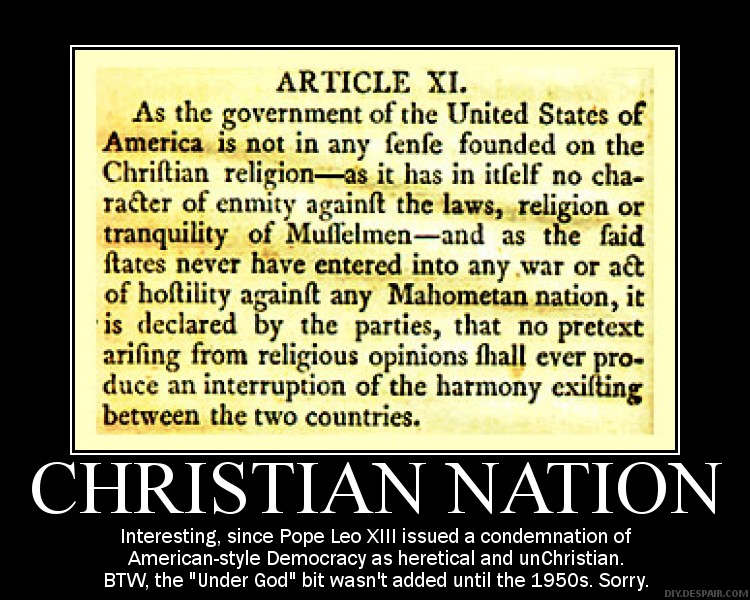
The Treaty of Tripoli (Treaty of Peace and Friendship between the United States of America and the Bey and Subjects of Tripoli of Barbary) was the first treaty concluded between the United States of America and Tripolitania, signed at Tripoli on November 4, 1796, and at Algiers (for a third-party witness) on January 3, 1797. It was submitted to the Senate by President John Adams, receiving ratification unanimously from the U.S. Senate on June 7, 1797, and signed by Adams, taking effect as the law of the land on June 10, 1797.
Did you catch what the sentences above say? The treaty was approved UNANIMOUSLY by the USA Senate. Here is the problem for those who try to claim that a Christian nation was founded after the Revolution. The USA Constitution became effective in June of 1788. Within less than a decade of its approval, the USA Senate formally declared that the “government of the United States of America is not in any sense founded on the Christian religion … .” The President agreed with that statement and signed the treaty. That means that those supposedly good and Christian Founding Fathers clearly stated in this treaty that there was no intention to found a Christian nation per se. Since the treaty was unanimously approved, this means that even the most religious of the Founding Fathers saw no problem with the statement that we are not in any sense a Christian nation.
The idea that we were founded as a Christian nation is an ahistorical version of what happened in the early days of this nation. The clearly stated and unanimously approved sense of Congress is that this nation was not founded as a Christian nation. All the modern arguments that we were founded as a Christian nation fail to deal with the clear statement quoted in the image above. As the anti-Christian demotivator listed above says, many of what we consider to be evidences of a Christian foundation were actually phrases or attitudes that were added up to 150 years after the founding of our country. The clearest statement made by Congress is the one above, in a treaty signed with a Muslim “Bey” (the governor of a district or province in the Ottoman Empire).
And, yet, there will be those who will continue to insist that we were founded as a Christian nation. Sadly, they will never deal with the phrases in the Treaty of Tripoli. Worse, they will come up with all sorts of specious arguments to claim that the unanimously approved phrase above does not really mean what it says. Does this mean that anti-Christian folk can force their will upon the Church? No, the safeguards of the Bill of Rights give us many protections. But, what it does mean is that the Church should have no expectation that the courts will rule in our favor when it comes to what is called the “public marketplace.” Does the idea of the separation of Church and State need to be amended? Yes, it does. The statements in the image above do not imply that the Church has no voice in society, only that the USA was not founded as a Christian nation. Current interpretation of Church and State have taken the turn that the Church cannot speak to the State. That is as an ahistorical phrase as the idea that we were founded as a Christian nation. Thus the idea of separation needs some redefinition. But, the statement above clearly does not support those who try to impose a Christian-centric view of our laws and of our policies.
This is a tough balance to achieve, but one we must strive to achieve.



[…] others will argue that they have the same rights. Arguing original intent will not work, as the Treaty of Tripoli clearly states that the, ““government of the United States of America is not in any sense […]